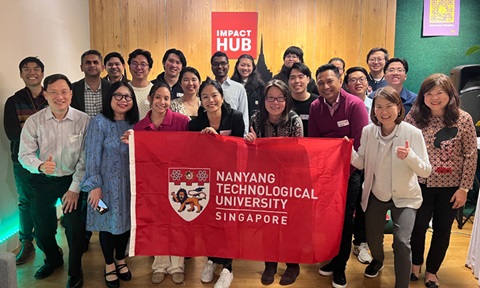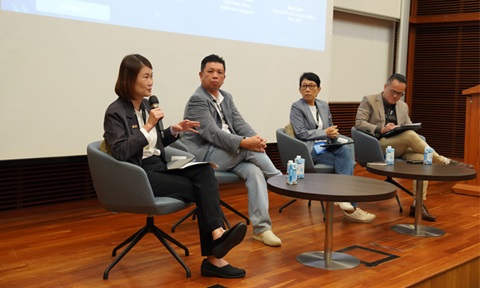Game for change in edtech business
Three alumni leading their edtech businesses shed light on how they transform teaching and learning using new technologies and look back on their NTU education.
By Nur Isyana Isaman
To develop a game-based educational platform that is more creative than Lego and more enjoyable than Disney. That was the vision of alumnus Raymond Sangyong Cho (TIP/2009) when he started his South Korea-based company, Globepoint, in 2012.
Eager to turn his vision into reality, Raymond invested heavily in recruiting experienced employees from the gaming industry. However, the results did not match his expectations because he overlooked the educational aspect of his business.
“My idea was innovative at that time, so I dreamt of rapid progression after establishing the company. However, the reality is, product commercialisation is a lengthy process. It took me about two to three years to conceptualise, develop – including repeated cycles of conceptualising and development, to finally launch my first software product in 2015. Every year, I invested S$1 to 2 million in product development,” said the NTUpreneur graduate.
His resilience paid off. Globepoint is now a market leader in South Korea’s edtech industry. Its main product, VRWARE, enables students to learn through virtual reality in metaverses similar to Minecraft and Roblox.
The South Korean government has deployed it to more than 250 public schools. The software has also been exported to 10 other countries, including the United Kingdom, China and Dubai. Besides Korean language, VRWARE supports English, Chinese, Vietnamese, Cambodian, Arabic, and Thai.
 Raymond Cho (first from left), the CEO of Globepoint, with some of his team members at an education expo in Singapore.
Raymond Cho (first from left), the CEO of Globepoint, with some of his team members at an education expo in Singapore.
Another alumna, Janine Teo (CCDS/2004), met hurdles when she first dabbled in edtech.
Like Raymond, Janine had a clear purpose when she co-founded Solve Education! Foundation, a non-profit organisation, in 2015. She wanted to leverage technology to make high quality education accessible to everyone.
She worked with teaching professionals and technology experts to develop an educational game app, which aims to reach students in marginalised communities, so that they can be employed and eventually gain economic empowerment.
The app uses artificial intelligence or AI to operate adaptively based on the learning pace and knowledge level of individual students rather than a one-for-all curriculum.
However, when Janine began the small-scale testing with the first batch of students in the West Java of Indonesia, she realised that she had underestimated their technological access.
She recalled, “The lack of quality devices and Internet connectivity were a huge barrier. Therefore, we needed to develop our game app as a lightweight app that could run on very low-end devices and require very little data. We had to do a lot more engineering to meet those requirements, so our development timeline became much longer. We also had to simulate poor Internet connectivity in our office so we could conduct rigorous testing,” said the 42-year-old CEO, who holds a Bachelor of Engineering in Computer Engineering.
Today, over 600,000 users have learned through Solve Education’s app, which operates in English and has been rolled out in schools across 40 countries, including Indonesia, Malaysia and Nigeria.
 Janine Teo (second row, fifth from left) with some of the Solve Education team members during a staff gathering.
Janine Teo (second row, fifth from left) with some of the Solve Education team members during a staff gathering.
Besides learning, it is just as important to be strategic in college application, and this is where the expertise of alumnus Rohan Pasari (MAE/2012) comes in handy.
Rohan co-founded Cialfo with the help of NTU. The company is behind a one-stop college application and career guidance portal with a flagship feature called “Direct Apply”.
Their customer segments are high schoolers and school counsellors who guide students in their journey to pursue college education. The portal lists more than 15,000 universities and students can use “Direct Apply” for 75,000 programmes offered by over 800 universities.
Rohan set up Cialfo based on his struggles as he did not have a dedicated counsellor at his high school in Kolkata, India. Since its inception in 2017, over 310,000 students from more than 1,500 international high schools across 105 countries have benefitted from Cialfo’s AI-driven portal. Every student is given a personalised experience throughout the entire journey from searching for universities to shortlisting, applying, and then enrolling. They can tap on Cialfo’s post-enrolment services, such as visa support and accommodation booking.
 Rohan Pasari (first row, sixth from left) with his team and Singapore’s Second Minister for Education, Dr. Maliki Osman (on Rohan’s right) during the unveiling of Cialfo's expanded global headquarters in Singapore in May 2023.
Rohan Pasari (first row, sixth from left) with his team and Singapore’s Second Minister for Education, Dr. Maliki Osman (on Rohan’s right) during the unveiling of Cialfo's expanded global headquarters in Singapore in May 2023.
Capitalising new technology
While AI remains its key pillar, the Cialfo portal will be enhanced using advanced technology. “We are looking to deepen our technological capabilities so that we can provide even more personalised guidance, thus making our portal even more intuitive and effective in meeting the evolving needs of students and educators across diverse educational landscapes in different countries,” said Rohan.
“Technological innovation is the backbone of any edtech business. However, it is not just about using the latest technology, but also how it is used to solve real problems in the educational ecosystem,” added the Cialfo CEO.
Janine and her Solve Education team are also exploring the use of AI to build relationships with students. “Our chatbot teacher programme is very popular among youths because they enjoy texting rather than talking. We are looking into how we can translate this into something meaningful that can produce stronger learning outcomes,” she said.
Nevertheless, even with the rapid growth of AI, Janine believes that it will not replace human teachers. “Education is not just content and curriculum; there are other aspects such as social and emotional skills, which cannot be taught using AI. Hence, AI can only go as far as complementing human teachers.”
 Janine (centre) with Malaysian students at an appreciation ceremony for Solve Education’s app users.
Janine (centre) with Malaysian students at an appreciation ceremony for Solve Education’s app users.
Meanwhile, Raymond has laid out plans for Globepoint’s new software. It will focus on content intellectual property and user-generated content in the metaverse, which is a key feature in his main software.
“The future of content creation is expected to shift towards user-centric platforms and Globepoint aims to provide the necessary technology for this evolving market,” he said.
Reminiscing their beginnings
Before founding Globepoint, Raymond was already working in the edtech industry. But, he wanted to start his own business, so he pursued the Master of Science Technopreneurship and Innovation Programme at NTU. His company, now over a decade old, was incubated as a start-up at NTU.
“I enrolled in NTU with the intention of starting my own business after graduation. During the programme, I met the late Prof Tan Teng Kee whom I deeply respect and will always remember for helping me understand the concepts of conducting business and how to stand up against competition,” said the 49-year-old.
 Raymond and his coursemates with the late Prof Tan Teng Kee (first from left) during one of the international collaborative classes held in Stanford, California as part of his Master’s programme.
Raymond and his coursemates with the late Prof Tan Teng Kee (first from left) during one of the international collaborative classes held in Stanford, California as part of his Master’s programme.
Cialfo was incubated at NTU and Rohan’s co-founder, Stanley Chia (NBS/2013) was his classmate for the Minor in Entrepreneurship course.
“The MOE Tuition Grant that I received from NTU enabled me to pursue my academic interests without the burden of financial constraints. I embraced a multidisciplinary approach combining engineering, economics, and entrepreneurship in my studies, and graduated as a double Gold Medallist. Studying alongside students from diverse backgrounds and leading group activities with them prepared me to now head a global team of over 170 professionals,” said the 34-year-old.
Rohan gives back to his alma mater through active engagement with current undergraduates, sharing insights from his entrepreneurial journey to inspire them.
 Rohan with his sister and parents during his convocation.
Rohan with his sister and parents during his convocation.
As for Janine, who mentors budding start-ups at NTU Entrepreneurship Academy, her university education kickstarted her career. She secured a job even before graduating.
“My first job was a computer engineer in France. The company interviewed and hired me based on my final-year university project. Then, I pivoted to hospitality and climbed through the corporate ranks. Through those experiences, I started noticing various societal issues and realised that they all point back to education. Nobody is stupid, but there are many people who do not get the opportunity to learn. I hope to change that though Solve Education.”
 Janine (seated, third from left) with some of her university friends.
Janine (seated, third from left) with some of her university friends.







